Dashnor Kaloçi
Memorie.al/ publishes the rare and unknown testimonies of Mrs. Flora Sata Dishnica, former secretary of Enver Hoxha at the General Staff of the National Liberation Army during the war, who passed away a few weeks ago, at the age of 96, who together with her husband, Dr. Ymer Dishnica and their children suffered in exile until the beginning of the ’90s, after they were beaten by Enver Hoxha in the beginning of the’ 50s, as “enemies of the people”! Rare testimonies of Mrs. Dishnica, otherwise known as Gjystina Sata, regarding the intrigues, machinations and behind the scenes of Enver Hoxha, in the physical elimination of his closest friends and collaborators, such as Mustafa Gjinishi, for whom he (Enver) had charged Liri Gega, while she was in the district of Dibra with the First Assault Division, which she commanded, her husband, Major General, Dali Ndreu, who were also shot by Enver in 1956, also to cover the tracks of his crimes during the War period!
“Together with Teodor Heba, we were working with the secret figure in our room in Helmas, where the General Staff was located. We worked with three secret figures, which were: one for Miladin, one for Enver and the other open to all. Only Theodore and I knew these figures, which, according to the orders given to us by the persons to whom they were addressed, we either deciphered ourselves or gave to them. The telegram that came to Gjinish was very secret and was addressed to Enver by name. As soon as I got it, I took it to Enver and he said, ‘Decipher it yourself.’ The telegram read: ‘Everything ended successfully, according to your order. Prisni phonogramin’. Theodore, who was a very closed man, told me to take it to Enver and I told him that I gave it to Enver, but he said: ‘Decipher it for you’. I, as a great curiosity that I was, could not wait for the next day to see that whatever that phonogram had. That day came the long telegram with a simple figure for our office, where among other things it was said: ‘Passing on a mountain pass (I do not remember the name but it was somewhere in the area of Dibra), we encountered an ambush where it was positioned the treacherous hand of the enemy, who shot our dear friend Mustafa Gjinishi in the back. A great loss for us and for the War. We are saddened to announce this news. ‘ After reading the fongram, I said to Theodore: ‘This thing was successful’?! This is how the former secretary of Enver Hoxha at the General Staff of the National Liberation Army, Flora Sata Dishnica, remembered, who passed away a few weeks ago at the age of 96, (on November 7, 2020) the intrigues and behind the scenes of her former boss , regarding the physical elimination of Mustafa Gjinish, one of the personalities of the Antifascist War in Albania.
These testimonies that are published for the first time in this article, we received from Mrs. Flora Sata Dishnica, some time ago at her home in Tirana, together with the well-known researcher and historian, Sherfif Delvina, (husband’s first cousin of her, Dr. Ymer Dishnica), provided that we publish them only after her separation from life. In this context, also as a sign of homage, for Mrs. Flora Sata Dishnica, Memorie.al decided to publish them.)
Who was Mustafa Gjinishi?
Mustafa was born in 1910, in the village of Gjinish in Peqin in one of the most famous families of that province. His father Adem Gjinishi, in the early 1920s, joined a group of politicians led by Fan Noli, and during the 1923 parliamentary election campaign, he was assassinated by his political opponents, who according to some testimonies , were said to have been supporters of Shefqet Vërlac, who at the time was in close alliance with Ahmet Zogu. In the late 1920s, Mustafa Gjinishi was able to obtain a state scholarship to continue his studies at the Harry Fultz American Technical School in Tirana, which was made possible by King Zog, who had made it a habit to send his children to schools to help the families of his political opponents. After finishing this school with very good results, Mustafai, returned to his family in the vicinity of Peqin, who continued to be at enmity with the Vërlacs and also King Zog. Based on this situation, Mustafai was forced to emigrate outside Albania and settled in Yugoslavia, where he gained political asylum. During his emigration, Gjinishi was employed for some time at the British Embassy in Belgrade, as a translator. After the Italian fascist aggression against Albania in 1939, Mustafai joined Abaz Kupi and Mustafa Kaçaçi, as well as several other anti-fascist emigrants, who at that time were in Yugoslavia waiting to return to Albania. As part of the organization of the Anti-Fascist War in the Balkans, which was taken over by the British government and the Americans, at the end of 1941, Gjinishi returned to Albania together with Abaz Kupi and Mustafa Kaçaçi, accompanied by an English major called Crispp. While returning to Albania illegally, they passed through Dibra, where they got in touch with Haxhi Lleshi, and together with him came to Tirana, where Gjinishi immediately got in touch with Myslym Peza, the closest friend of his father Ademi.
But who was Mustafa Gjinishi and what was his past since the time when his father was killed (candidate for MP of the Albanian Parliament as a supporter of Fan Noli) and his life in emigration in Yugoslavia, as a translator at the British Embassy in Belgrade? Why did the British help Gjinishi return to Albania together with Abaz Kupin and the English major Crissp? What relations did he have with Enver Hoxha and other members of the General Staff, what were the reasons that forced Enver Hoxha to decide on the physical elimination of Gjinisht and under what circumstances was his murder carried out?
Enver’s memories of Gjinish coming to Albania
Regarding the arrival of Gjinishi in Albania, Enver Hoxha in his memoirs published in the early ’80s, among other things wrote: “Gjinishi was a smart, dynamic, active, but arrogant man, closed to us and not honest. He spoke with gestures as if to create authority. He wanted to show that he had great connections and influence with Myslym Peza, as well as in many anti-fascist ‘nationalist’ circles, he made it clear that in these circumstances, his words and advice were heard a lot. He did not tell us anything concrete. We later found out where his ‘bases’ and ‘supports’ were. Allegedly illegal, he roamed all over Tirana in black glasses, blue clothes, sometimes with a sackcloth, sometimes with a kilt and sometimes with a cap, wearing a white cap and holding a black bag in his hand, where there were letters, a ‘ten’ turkey and two Yugoslav bombs. Our people reported to us that he went and met with Irfan Ohri, Mit’hat Frashëri, Sheh Karbunara, Kamber Qafmolla and Abaz Kupi and others. “What he was talking to them, he told us a few concrete things”, Enver remembers the arrival of Gjinish in Tirana, whom he would later have as one of his closest collaborators.
With Enver in Peza and Labinot
After returning from Yugoslavia, Gjinishi together with Koço Tashko were appointed by the Central Committee of the SNP to work with the nationalists and make propaganda to bring them closer to the National Liberation Front led and led by the Communist Party. Regarding this, Enver Hoxha wrote in his memoirs, among other things: “The Central Committee charged Koço Tashko, Mustafa Gjinishi and Anasatas Lula who would do the party’s work with the nationalists. Anastas Lula intended not to increase the party’s influence, but to undermine it and form its own faction with Sadik Premten. “Koço Tashkoja, with his elders, locked himself in cafes and did ‘big politics’ with them, while Mustafa Gjinishi was more active, but in his contacts and connections there were always suspicious things and mysteries”. (Enver Hoxha. “When the foundations of the new Albania were laid” p. 69) Gjinishi together with Koço Tashko, who before the Peza Conference, had drafted a platform where they wanted the Communist Party to call and approach the ranks of the Front of all the nationalists and anti-fascists who had given evidence that they were for war against the Italians. In addition to the well-known names like Muharrem Bajraktari, and Abaz Kupi, they demanded that in the ranks of the Front, approach a part of the Northern Catholic Clergy who had opposed the Italian aggression against Albania and were in anti-fascist positions, as well as Mehdi Frshëri who had been exiled by the Italians.
Regarding the arrival of Abaz Kupi at the Peza Conference, Enver Hoxha asked Gjinish if he was invited, would he come there. Gjinishi vowed to Enver that he would fix it. Enver ordered Gjinish to talk to Abaz Kupi but not to pray too much, saying: “If he wanted to come, if he did not want, the good way”. (Gjinishi and Tashko saw Enver Hoxha’s attitude towards the nationalists as a big mistake and for these few days after that Conference, Koço Tashko wrote a long letter to the Comintern, where he denounced the policy of the SNP and personally of Enver Hoxha). In the Peza Conference, where Gjinishi was one of its main initiators, together with Koço Tashko, he participated in the delegation of the Communist Party, which consisted of: Enver Hoxha, Dr. Ymer Dishnica, Ramadan Çitaku and Koço Tashko. In this meeting, Mustafa Gjinishi, together with Enver and Dr. Dishnica, were elected to the Antifascist National Liberation Council, which consisted of seven people. At that meeting, Gjinish was assigned to have Central Albania under his patronage, to work with the nationalists and to send them the messages of that Conference. Afterwards, Gjinishi was elected to the General Staff of the National Liberation Army (whose meeting was held in Labinot, on July 10, 1943), together with: Enver Hoxha, Mojsiu, Kupi, Peza, Lleshi, Çitaku, Dishnica, Spahiu , Baba Faja, Ndreu and Malëshova.
Secretary of the Committee for National Salvation in Mukje
Charged by the Central Committee of the SNP, with the task of including nationalists in the ranks of the Front, Mustafa Gjinishi, after having previously talked to Hasan Dosti, talked about it with Abaz Kupi, and both drafted a message (of which was also signed by Myslym Peza with Dr. Ymer Dishnica), where they invited the leaders of the National Front for talks. They then sent this message to the leaders of Balli, to look at the possibility of a joint meeting between them, which they accepted and then gathered in what is now known in history as the ‘Mukje Conference’. Mustafa Gjinishi was one of the 12 participants of the SNP delegation that was represented at that Conference where he was elected secretary of the meeting, which was chaired by Thoma Orollogai and later Secretary of the National Salvation Committee, chaired by Hasan Dosti. As it is known, this agreement was later denounced by Enver and Gjinishi and Dr. Dishnica, would have successive consequences regarding that agreement.
Gjinishi: “My fate is not known after the denunciation of Mukje”?!
In the autumn of 1943, Hasan Dosti, one of the main exponents of the Balli Kombëtar, called his friend Gjinishin to a meeting at his house in “Moskatet” to talk about preventing the bloodshed that had begun between the communists and Balli… This meeting is confirmed by Viktor Dosti (Hasan’s eldest son), who was present at the conversation that his father had with Gjinish. Regarding this, Viktori recalled: “Mustafa had come to our house other times with Nako Spiro, because he was a close friend of his father. I remember that day, he was very worried and when he came home, he had a bag of bombs with him. During the conversation, among other things, the father asked Gjinishi: who would win the war and Gjinishi replied: ‘If we of the National Liberation Union join you of Balli, Albania will win’. Meanwhile, the father continued the conversation by saying to Gjinish: “If we do not unite, you will win, because you know our weakness, that we cannot consider you enemies and fight you as you fight us.” After that, Gjinishi continued: ‘You are winning, I am sure I will not get a thorn in my side. Otherwise, it is not known how your fate and mine will come together ‘. After these words, Gjinishi got up and left our house to never meet again with our father Hasan, who loved and respected him very much “, recalled Viktor Dosti, regarding that meeting where Gjinishi expressed to Dost the insecurity that awaited him in case the War would be won by Enver Hoxha’s partisans!
Enver’s suspicions about Gender!
Enver’s great jealousy towards Mustafa Gjinish, seems to have increased even more in the spring of ’43, when, close to the senior partisan leadership of Enver Hoxha, British missions came and were attached. This is evident in his memoirs where, among other things, Enver states: Mustafa, ‘cheerful’, ‘interesting’ and ‘sincere’ as the English said about him, had the advantage that he knew English and could speak fluently with them, and could translate back and forth. “We tried to make the connection between some meetings of the British with ‘nationalist’ personalities and the meetings that Mustafa had made before, with these people who were now openly with Balli, but nevertheless we had not yet found the beginning of the elaboration of this mess.” Enver clearly expresses the doubts he had about Gjinish, lest he be an ‘agent of the English’! In this regard, Enver writes that at that time, he caught a signal from the British radio BBC, addressed to “Tafar”, which according to him, was the nickname of Gjinish, which was confirmed by Mustafa Kaçaçi. After that, Enver says that he called Gjinish to Labinot and forced him to show that he was an agent of the British and he admitted that he was a collaborator of the British, for the good of Albania, but not their agent and had connections with them. started in Yugoslavia with Lieutenant Colonel Oklai Hill, who had launched it in Albania together with Abaz Kupin. Enver also testifies that after Gjinishi showed all the connections and tasks given to him by the English, he apologized and said that he “deserved the shooting” by handing the revolver to him. “After several hours of brainstorming between us, weighing everything: the circumstances of the war, the social circle and the acquaintances of Gjinish, his dangerousness, his treacherous actions, his arrogant, bayraktar character, the full assertion of activity, we decided not to we were sentenced to death “, Enver testifies, regarding the decision not to shoot Gjinishi, after it was learned that he was an” agent of the English “and according to him, Gjinishi said that he would remain loyal to the Party:” But in the future, he never became a good man, he continued the path of betrayal, he was and remained an agent of the English “, Enver writes in his memoirs. (“Anglo-American Danger” pp.202-203). /Memorie.al
Continues tomorrow





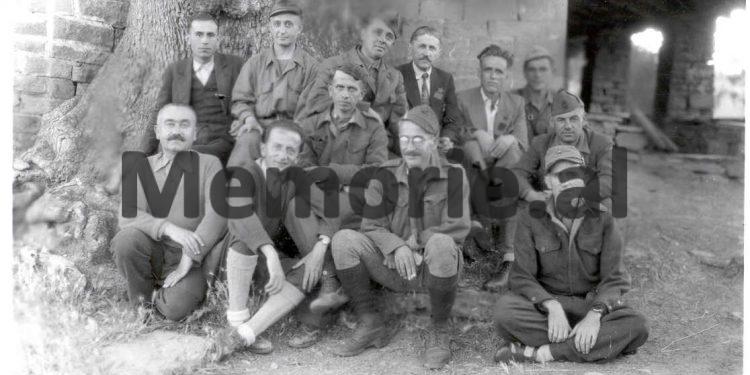
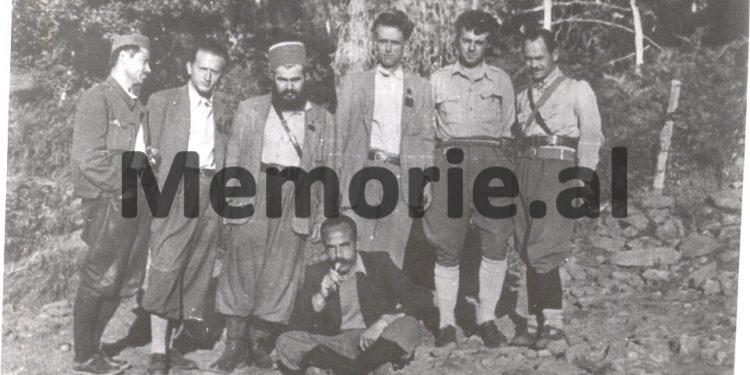




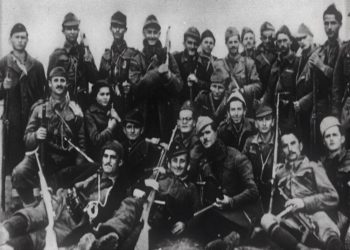
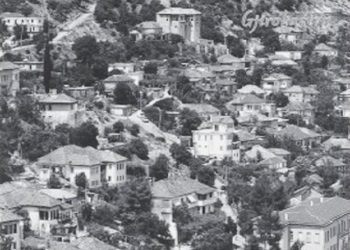
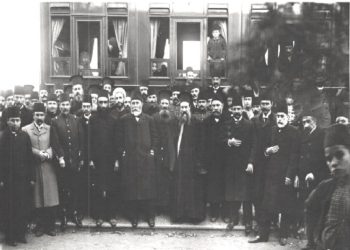
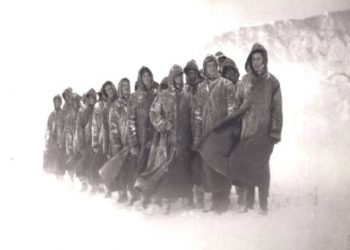

![“When the party secretary told me: ‘Why are you going to the city? Your comrades are harvesting wheat in the [voluntary] action, where the Party and Comrade Enver call them, while you wander about; they are fighting in Vietnam,’ I…”/ Reflections of the writer from Vlora.](https://memorie.al/wp-content/uploads/2025/06/admin-ajax-4-350x250.jpg)
